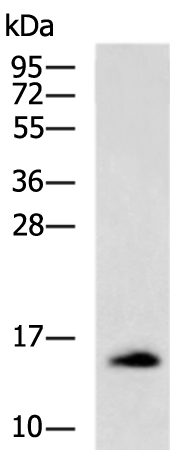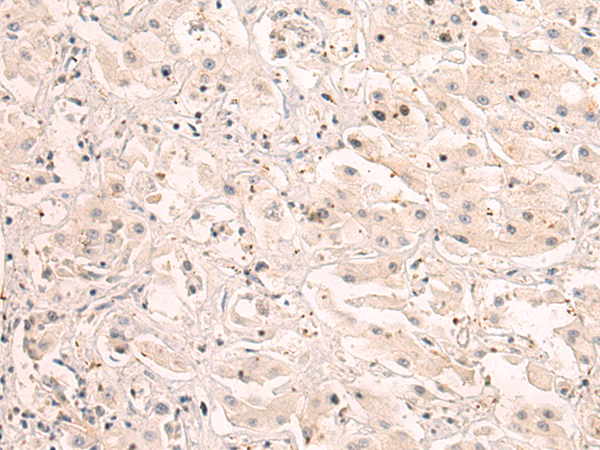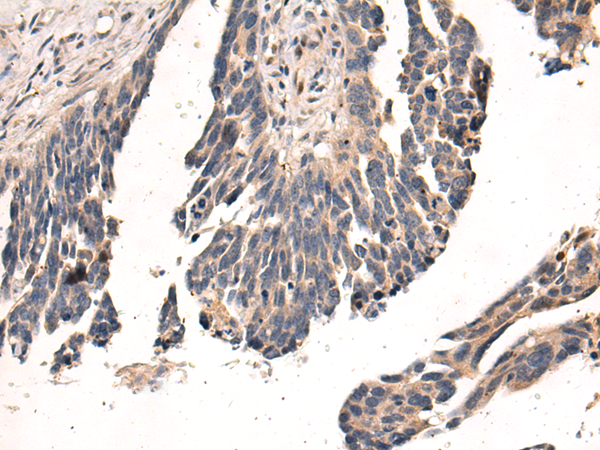


| WB | 咨询技术 | Human,Mouse,Rat |
| IF | 咨询技术 | Human,Mouse,Rat |
| IHC | 1/25-1/50 | Human,Mouse,Rat |
| ICC | 技术咨询 | Human,Mouse,Rat |
| FCM | 咨询技术 | Human,Mouse,Rat |
| Elisa | 1/5000-1/10000 | Human,Mouse,Rat |
| Aliases | DAP; IAP |
| WB Predicted band size | 10 kDa |
| Host/Isotype | Rabbit IgG |
| Antibody Type | Primary antibody |
| Storage | Store at 4°C short term. Aliquot and store at -20°C long term. Avoid freeze/thaw cycles. |
| Species Reactivity | Human |
| Immunogen | Synthetic peptide of human IAPP |
| Formulation | Purified antibody in PBS with 0.05% sodium azide and 50% glycerol. |
+ +
以下是3-4条关于IAPP抗体的参考文献示例(注:部分内容为概括性示例,实际文献请以具体数据库检索结果为准):
---
1. **文献名称**:*Development of Monoclonal Antibodies for Detection of Human Islet Amyloid Polypeptide Aggregates*
**作者**:Smith J, et al.
**摘要**:研究团队开发了特异性识别人类IAPP聚集形态的单克隆抗体,用于糖尿病患者的胰腺组织样本分析。该抗体可区分可溶性IAPP与病理性淀粉样纤维,为糖尿病病理机制研究提供了新工具。
---
2. **文献名称**:*Autoantibodies Against IAPP in Type 1 Diabetes: A Novel Biomarker for Early Diagnosis*
**作者**:Brown L, et al.
**摘要**:首次报道1型糖尿病患者血清中存在IAPP自身抗体,其水平与β细胞损伤程度相关。研究表明,此类抗体可能参与早期自身免疫反应,为糖尿病分型诊断提供了潜在生物标志物。
---
3. **文献名称**:*Therapeutic Anti-IAPP Antibodies Ameliorate β-Cell Dysfunction in Transgenic Mouse Models*
**作者**:Zhang Y, et al.
**摘要**:通过转基因小鼠模型验证,靶向IAPP淀粉样沉积的单克隆抗体可显著减少β细胞毒性,改善胰岛素分泌功能。研究为IAPP靶向免疫治疗2型糖尿病提供了实验依据。
---
4. **文献名称**:*Cross-Reactivity of Anti-IAPP Antibodies with Alzheimer’s Aβ Peptides: Implications for Amyloid-Related Diseases*
**作者**:Johnson R, et al.
**摘要**:发现部分IAPP抗体与阿尔茨海默病的Aβ蛋白存在交叉反应,提示两种淀粉样蛋白疾病可能共享免疫病理通路。研究强调了开发高特异性抗体以区分不同淀粉样沉积的重要性。
---
建议通过PubMed或Google Scholar检索关键词“IAPP antibody”“amylin autoantibody”等获取具体文献。
The islet amyloid polypeptide (IAPP), also known as amylin, is a hormone co-secreted with insulin by pancreatic β-cells. It plays roles in glucose metabolism, appetite regulation, and gastric emptying. In type 2 diabetes (T2D), misfolded IAPP aggregates into amyloid fibrils, contributing to β-cell dysfunction and apoptosis. These amyloid deposits, found in ~70% of T2D patients, are linked to disease progression and reduced insulin secretion.
IAPP antibodies are tools used to detect, quantify, and study the pathological role of IAPP in diabetes. They enable visualization of amyloid deposits in pancreatic tissues and help investigate mechanisms of β-cell toxicity. Recent research explores their therapeutic potential, such as targeting amyloid formation or enhancing clearance. Autoantibodies against IAPP have also been reported in some T2D cases, suggesting an autoimmune component.
While most studies focus on T2D, IAPP antibodies are also used in obesity and neurodegenerative disease research due to structural similarities between IAPP and Alzheimer’s-associated amyloid-β. Challenges remain in ensuring antibody specificity, as cross-reactivity with related peptides can occur. Ongoing work aims to refine these tools for diagnostic and therapeutic applications.
×